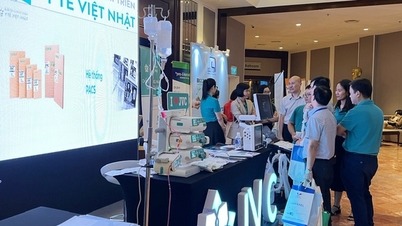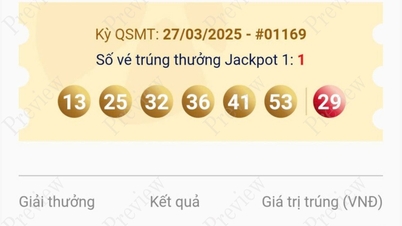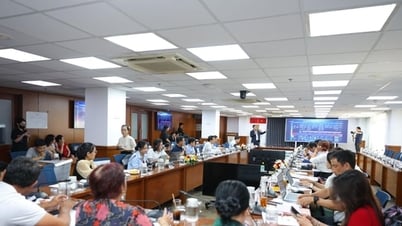ANTD.VN - The implementation of electronic invoices generated from cash registers in phase 2 is facing more difficulties due to the lack of mandatory regulations.
Hanoi Tax Department said that the unit is currently managing 195,000 enterprises and 186,000 business households.
Of which, according to initial statistics, there are 5,838 enterprises and business households (paying taxes by declaration method) operating in 5 fields subject to applying electronic invoices generated from cash registers: food and beverage, restaurants, hotels; shopping malls, supermarkets, consumer goods retail; retail of modern medicine; entertainment services; gold and silver trading.
The 2022 budget revenue of enterprises and business households in the above 5 groups is 4,181 billion VND, accounting for 1.36% of total budget revenue and 6.5% of non-state revenue.
Based on the conditions for implementing electronic invoices generated from cash registers, the Hanoi Tax Department sets out the implementation roadmap as follows:
Phase 1 (until March 31, 2023): Implemented for businesses and business households using the declaration method operating in 5 prescribed business lines and using cash registers/sales management software
In the above case, the taxpayer is eligible to apply electronic invoices generated from cash registers. Through review, in Hanoi, it is determined that there are 3,300 enterprises and business households.
Phase 2 (from April 1 to December 31, 2023): Implemented for businesses and business households using the declaration method that are operating in 5 prescribed business lines but have not yet used cash registers/sales management software.
The subjects of phase 2 implementation are cases that do not meet the conditions to implement electronic invoices generated from cash registers. After initial review, there are currently 2,538 enterprises and business households. Tax authorities are continuing to review and supplement during the implementation process.
 |
Hanoi aims to have all qualified businesses use electronic invoices generated from cash registers by the end of the third quarter. |
Hanoi Tax Department has set a target of continuing to support the above cases to access and use, modernize business management, and support 100% of taxpayers to register and use electronic invoices generated from cash registers immediately after meeting the application conditions.
Implementing according to the defined roadmap and goals, in phase 1, Hanoi Tax Department has guided 3,300 enterprises and business households in 05 industry groups, using cash registers/sales software to successfully register for implementation on the tax authority's electronic invoice system.
For phase 2, up to now, Hanoi Tax Department has continued to guide 1,723 enterprises and business households in this phase to access and use cash registers/sales software and successfully register for implementation on the tax authority's electronic invoice system.
According to the leader of the Hanoi Tax Department, the implementation of phase 1 has many advantages because the subjects of implementation are businesses and business households that have used cash registers/sales software in production and business activities, revenue management, and are also a group of subjects with good awareness in complying with the law.
However, in phase 2, implementation is more difficult because current legal regulations do not have mandatory provisions on the use of electronic invoices generated from cash registers.
Meanwhile, some units do not have the need to use cash registers/sales software. The implementation of electronic invoices generated from cash registers also causes some problems regarding costs and data conversion plans, leading to units refusing to change management methods.
In addition, some businesses and business households have low awareness of law compliance.
Source link



![[Photo] Solemn opening of the 9th Session, 15th National Assembly](https://vphoto.vietnam.vn/thumb/1200x675/vietnam/resource/IMAGE/2025/5/5/ad3b9de4debc46efb4a0e04db0295ad8)


![[Photo] National Assembly delegates visit President Ho Chi Minh's Mausoleum](https://vphoto.vietnam.vn/thumb/1200x675/vietnam/resource/IMAGE/2025/5/5/9c1b8b0a0c264b84a43b60d30df48f75)


























![[Photo] Bus station begins to get crowded welcoming people returning to the capital after 5 days of holiday](https://vphoto.vietnam.vn/thumb/1200x675/vietnam/resource/IMAGE/2025/5/4/c3b37b336a0a450a983a0b09188c2fe6)
![[Photo] General Secretary To Lam receives Sri Lankan President Anura Kumara Dissanayaka](https://vphoto.vietnam.vn/thumb/1200x675/vietnam/resource/IMAGE/2025/5/4/75feee4ea0c14825819a8b7ad25518d8)




































































Comment (0)